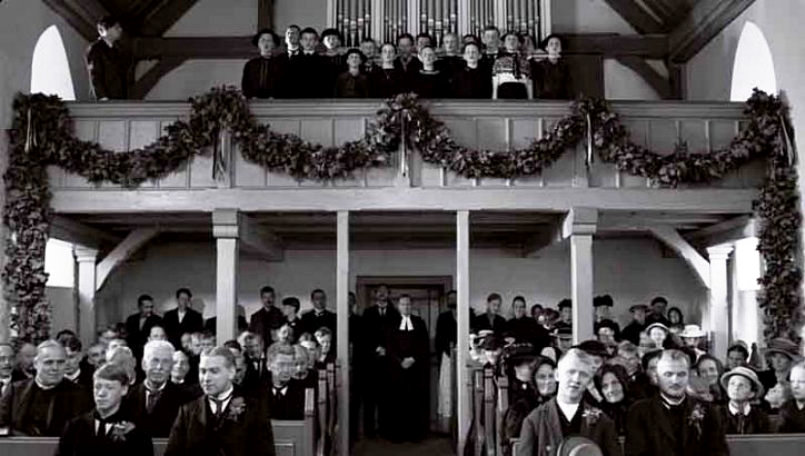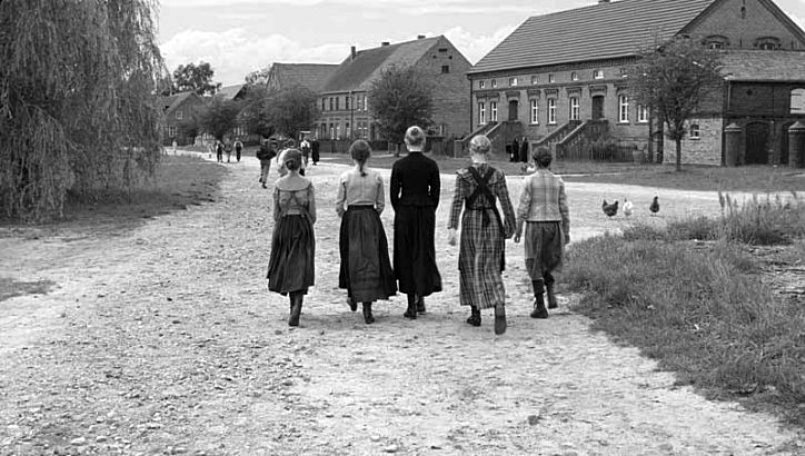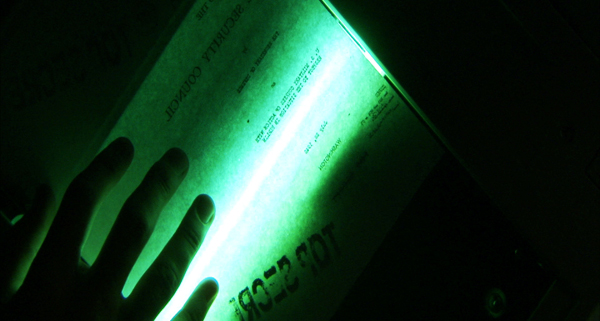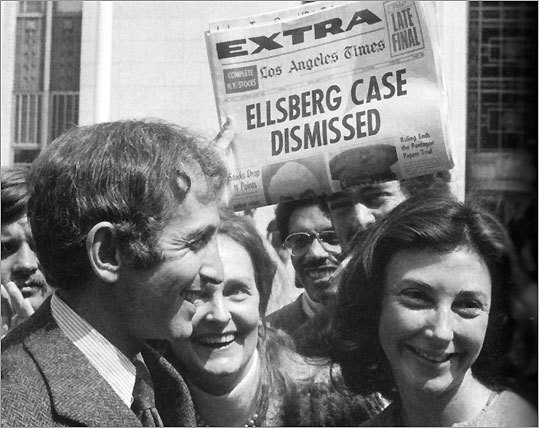“36,000 Feet: The Challenger Deep, lowest known point in the ocean. It is believed there are lower undiscovered points, as only 10% of the ocean has been mapped.” There are old, foul things in the Deep Places of the World: By way of DYFL and Lots of Co, a rather off-putting graphic of the Mariana Trench to scale. Venturing out into the Great Beyond of space always sounds exhilarating to me. But, for some reason, being that far down below the murky depths…not so much.
Category: World at Large
Village of the Damned.

The kids are alright? Not hardly. As the second half of a Saturday double-feature with Daniel Ellsberg: The Most Dangerous Man in America, I caught the Oscar favorite for Best Foreign Film this year, Michael Haneke’s The White Ribbon. Alas, meine freunde, I found it underwhelming.
Put briefly, and while adding a frisson of Funny Games‘ Aryan youths-gone-wild to the mix, The White Ribbon attempts to do for the rise of the Nazis in Germany what Haneke’s Cache did for the French-Algerian conflict. But, at least for me, lightning didn’t strike twice. Perhaps it’s due to either knowing the trick this time ’round or having a greater familiarity with the history at hand, but I thought the allegorical content of Ribbon started out rather didactically, and only got more obvious and belabored at the movie churned along. And, shorn of its historical musings, the story here doesn’t really hold up on its own — It’s mostly just long, meandering takes of (usually) unfortunate things happening to German peasants.
First, the story. The year is 1913, and in the (fictional) village of Eichwald, a German doctor (Rainer Bock) is thrown from his horse and gravely injured, apparently due to a tripwire someone — one of the Black Hand? — placed across his path. And before this event can even be fully processed, another tragedy takes place: A worker for the local Baron (Ulrich Tukur) falls through some rotted boards to her death. Yep, Eichwald is having a frozen run of luck like you read about.
As suspicions and recriminations deepen throughout this hamlet, more troubling events ensue. An aggrieved farmer ruins the harvest festival by slaughtering all the Baron’s cabbages. The Baron’s young son is taken by unknown parties and brutally horsewhipped (for some reason, and as in Doubt, nobody ever thinks to ask the kid who did this to him.) Fires are set, folks disappear (or leave while they still can), birds are mutilated, and, perhaps most frightening, even souls are in peril: For example, the son (Leonard Proxauf) of the local reverend (Burghart Klaubner) puts his eternal salvation in doubt by indulging in a nasty habit of onanism. To be sure, this evil must be beaten out of him, and his siblings, as soon as possible. In other words, we must destroy these children in order to save them.
Narrating this tale throughout (as an old man, years on) is the local schoolteacher (Christian Friedel), who, as a relatively young newcomer to the village, stands between its feuding generations. When not courting the Baron’s young nanny (Leonie Benesch), he watches the events unfolding in town with growing unease, and tries to figure out who is responsible for all the incidents driving the citizens of Eichwald mad. The problem is, he’s already tipped what’s actually going on in the very first scene of the movie, when he says something along the lines of “This is not just the story of a random German village, but the story of my nation.” Ooh, really? Allegory time.
Pretty soon thereafter, we are regaled with a scene where the Reverend’s children are taken to the proverbial woodshed and unduly punished for their transgressions, real and imagined. Given both the time I’ve spent on this subject in recent years and the schoolmaster’s “time to play German History Jeopardy!” warning in the first scene, this set off Versailles Conference bells and alarms right away, and especially so once these children are then forced to wear white ribbons as symbols of purity. Hmm…who else in 20th century German history ran around wearing armbands? Let me think on it.
The rest of the story pans out as you might expect. For various reasons, predominant among them the Sins of the Father(s), these kids go terribly wrong, eventually even going so far as to attack a developmentally disabled boy (i.e. the local minority in their midst.) Also, for some reason, the movie is constructed like a mystery, even tho’ — even if you didn’t pick up on all the hints in the last paragraph — one of the kids basically confesses to the schoolteacher what’s going on in the first reel. Uh, can we speed this along? Bitte?
I’d like to say The White Ribbon remains engaging despite all of its allegorical ambitions. But it doesn’t, really. When you’re not playing spot-the-German-history as it goes along — Is the Baron supposed to be Kaiser Wilhelm? Are we gonna get a Beer Hall Putsch? Hey, look, Pius XII! — Ribbon mostly just offers long, intermittently interesting digressions on agrarian village life, like harvest festivals, courting carriage-rides and the cruelest break-up of the German pre-war period. (Some of this plays a bit like Todd Haynes’ Far from Heaven — A period film, told in period (B&W) style, with then-taboo subjects like incest, sexual assault, and the aforementioned onanism now thrown in.)
Simply put, there’s not enough story to sustain interest in this enterprise without the allegorical content that’s driving the movie. And, since this allegory was tipped in the opening half-hour, I pretty much just spent most of The White Ribbon waiting for all the various little Nazi shoes to drop. Without either the ambiguity or the open-endedness of Cache, I found The White Ribbon on the pedantic and stultifying side, and I can’t really recommend it. It’s not terrible or anything, but it is rather long and uninvolving, and I have to think one of the other Foreign Film contenders probably puts on a better show.

The Patriot.

On one hand, the film makes for an interesting moral counterpoint to The Fog of War: Ellsberg’s actions put the lie to a lot of McNamara’s convenient post-hoc rationalizing therein — clearly, SecDef could’ve done more at the time to end the war in Vietnam.) On the other, Ellsberg also works as a prequel of sorts to All the President’s Men — to say nothing of a generation of seventies paranoia epics like The Parallax View and Three Days of the Condor. But in the end, The Most Dangerous Man in America probably works best as an eloquent testament to the words of the late Howard Zinn (who appears here as an old friend of Ellsberg): “Dissent is the highest form of patriotism.”
Like Man on Wire, Ellsberg starts here in media res, and at the scene of the history-making crime. Furtive eyes scan back and forth as an old-school Xerox copier whirrs in the dark, its green light illuminating maps of Southeast Asia and the ominous words “Top Secret” from below. With no zip drives or electronic files to speak of, analyst Daniel Ellsberg is forced to copy the 7000 pages of the Pentagon Papers page by painstaking page. It’ll take months (and eventually he enlists the aid of his kids.) As the Xerox churns, we get up-to-date on the ramifications of the document being processed — bombs fall from the sky over North Vietnam and Cambodia, weary troops patrol the hot, fetid jungle, and Nixon and Kissinger obsess over the leaks in their war machine (with Kissinger giving Ellsberg his moniker: “the most dangerous man in America.”)
Cut back to several years earlier, when the future leaker of the Pentagon Papers seemed quite a different man indeed. A fresh-faced young ex-Marine with a crisp, no-nonsense Kennedy era haircut, Ellsberg began his tenure in government as one of the Best and the Brightest, with an enthusiasm for his 80-hour workweek matched only by his hawkishness. As one of McNamara’s boys, Ellsberg concedes to helping massage the data to create a casus belli for the war. His first day on the job is the Gulf of Tonkin incident that wasn’t, and he spends subsequent weeks trying to dredge up some, any, horrible atrocities in the region that might involve Americans.
But, over time, the scales fall away from Ellsberg’s eyes. In part because he makes the acquaintance of a luminous lefty-leaning journalist named Patricia, who eventually becomes his fiancee…twice. (Ellsberg has a great line about a guy he meets at a peace rally who’s a Trotskyist. He asks this fellow how in Hell he ever became a Trotskyist. The answer: “The same way anybody becomes anything. I met a girl.”) And in part because, driven with an analyst’s overriding compulsion to find the right answer, he starts going to Vietnam himself to lead recon missions on the side and get a better sense of the situation on the ground. Simply put, the Ground Game is not going well.
The rest, as they say, is history. Moved to throw a shoe into the gears of the war machine he had helped nurture into existence, Ellsberg goes rogue and decides to publish the top-secret history of the war. But, even if you feel like you know the story of the Pentagon Papers pretty well, and I thought I did, there are some fresh and intriguing insights here. For example, I’m not really one for Freudianism or overthinking coincidences, but it turns out Ellsberg suffered a tragedy at the age of 15 that made him uniquely primed to play the role in history he ended up playing. (His father fell asleep at the wheel during a road trip, prompting a crash that sheared the car in two and killed Ellsberg’s mother and sister. In other words, watch the authority figures at the wheel verrry carefully.)
And then there’s the man himself, who’s an engaging presence throughout (if perhaps with a touch of monomania — I could see him being a hard guy to get along with.) If The Most Dangerous Man in America has a flaw, it’s that the movie is quite one-sided in the end — Ellsberg even narrates much of the story, and you get the sense at various points there may well be some whitewash being applied. (Ellsberg has an ex-wife, and kids, that aren’t even mentioned for the first 45 minutes or so.) Still, I’m inclined to give Ellsberg — and Ellsberg — the benefit of the doubt (and not just because the man loves his movies.) Ever since George and the cherry tree, we’ve been smoothing the edges of our patriotic tales. And, whatever his misdeeds as a man, Daniel Ellsberg, the film makes clear, is a patriot, through and through.
I use this Cornel West quote rather often, but that doesn’t make it any less true: “To understand your country, you must love it. To love it, you must, in a sense, accept it. To accept it as how it is, however is to betray it. To accept your country without betraying it, you must love it for that in it which shows what it might become. America – this monument to the genius of ordinary men and women, this place where hope becomes capacity, this long, halting turn of the no into the yes, needs citizens who love it enough to reimagine and remake it.”
Daniel Ellsberg is one of those citizens. He saw an obvious crime being perpetrated by our government across multiple presidencies, and he did his part to help put a stop to it. In many ways, the story told in The Most Dangerous Man in America seems quaint: Johnson actually asked Congress for authority to bomb Vietnam? The press wasn’t rolling over like a lapdog in the wake of obvious propagandistic lies? (In fact, the media types who show up late in Ellsberg clearly possess some of the narcisstic sense of self-entitlement that has been our undoing of late. Ellsberg the civilian sweats blood and tears to get this 7,000-page document out in public, and the press poobahs act like they’re both the knowing gatekeepers and the heroes of the story.)
But just because Ellsberg’s brand of patriotism has fallen out of fashion in the era of Judith Miller and the chattering class doesn’t make this story any less relevant. It makes it more relevant. If we’re going to keep our young republic through its third century, we need more men and women of Ellsberg’s stripe. Men and women who will buck the trend, risk the ridicule and wrath of their well-connected peers, and stand up against injustice done under our collective name when they are party to it.
Presidents will get their due on this and every subsequent Presidents Day to come. But, now and again, it’s good to honor those patriots who, through non-violent principle and sheer, dogged determination, help to keep our leaders in check when the separation of powers fails — ordinary folks like you, me, and Daniel and Patricia Elllsberg.

The Old School Dealmakers.
“[L]ong before Hollywood discovered the Texan, he cut a wide swath through the House, always playing the roguish ladies’ man and macho militarist…[His] frequent, much more sober-styled partner was Democratic Rep. John Murtha, the Pennsylvania powerhouse who chaired the defense subcommittee so important to CIA funding for the Afghan cause. And the fact that both have died now within days of each other punctuates the end of a major chapter for the House left behind.“
Charlie Wilson, 1933-2010, and John Murtha, 1932-2010.
Snowpocalypse Now.
Snowpocalypse last December was only the beginning. Now, it’s Snomageddon. (And unfortunately, I uncorked all my tauntaun jokes back in 2003.) Anyway, yeah, we in DC have taken a massive snow hit — at least 2 feet already — and it’s still coming down strong.
As you can see from the pics above and below, at least Berk‘s been having great fun with it, although he may feel differently if I take him to the 2pm Dupont shootout.
Update: It’s all fun and games until somebody bruises their brain. While the snowball fight was great fun (and a hearty gratz to New Awlins), slipping on the ice while walking Berk later that evening was less so. So I’ve been suffering a (hopefully) minor concussion since Saturday, which mainly means I’ve been lying on the couch with a headache, playing low-intensity xBox games like Lego Batman and Mass Effect while the snow falls. Only one night of nausea, fever, and other nasty symptoms, tho’, so hopefully by this point, I’m on the mend.
O’ Beauteous Nymph.

“A statement released Friday by Virgin Limited Edition, the luxury arm of Virgin Hotels, described the Nymph’s launch like a plane’s takeoff. ‘Gliding on the water’s surface like an aeroplane on a runway, one of the three pilots will operate the joystick to smoothly dive down.'” The irrepressible Richard Branson unveils Virgin’s newest ride, the Necker Nymph. “The underwater plane uses the downward pressure on its wings to fly through the water for up to two hours at a time, while an open cockpit will give riders a 360-degree view. The Necker Nymph’s typical speed is 2 to 5 nautical miles per hour and it can dive more than 100 feet.“
As it turns out, I’ve recently made plans to join a gaggle of good friends on a week-long BVI sailing expedition this coming Spring. So I would start begging for donations here at GitM for the $400,000 required to stay on Necker Island for a week and enjoy this submersive Nymph. But, in all honesty, I’d probably just take that money and put it towards a jaunt on SpaceShipTwo. Priorities, people.
Praise the Lord and Pass the Ammo.

I like Saving Private Ryan as much as the next guy, but this, in a word, is ridicky-goddamn-diculous. Apparently, our troops in Iraq and Afghanistan are routinely outfitted with sniper rifles etched with New Testament verse. “Trijicon confirmed to ABCNews.com that it adds the biblical codes to the sights sold to the U.S. military. Tom Munson, director of sales and marketing for Trijicon…said the inscriptions ‘have always been there’ and said there was nothing wrong or illegal with adding them. Munson said the issue was being raised by a group that is ‘not Christian.’“
Newsflash: Given that we’re currently engaged in multiple wars and are strongly trying to avoid any appearance of being involved in any sort of anti-Muslim Crusade, arming our soldiers with “Jesus rifles” and crafting bible-thumping war reports for the Commander-in-Chief isn’t just catastrophically stupid. It’s basically writing the Al Qaeda recruiting posters for them.
Update: Also, “They started it!” is not an appropriate response to this dismal revelation.
Update 2: Trijicon stands down — Jesus rifles are hereby discontinued, most likely because of quotes like these: “General David Petraeus also addressed the scopes this morning, calling the matter ‘disturbing and a serious concern for me.‘”
Horror in Haiti.

Red Queue, Blue Queue.
By way of the NY Times, here’s a map of what Americans are renting from Netflix. Apparently, the Fort Myers military base at zip code 22211 has radically different viewing tastes than the rest of DC, and Manhattan and Brooklyn (but not New Jersey) love them some Mad Men.
Last of the Kon-Tiki. | The Man Twice-Bombed.
“Twice he was captured and escaped, once by back-flipping over a snow bank and running off into the woods before his guards could use their weapons. A third time, surrounded by the Gestapo at a maternity hospital in Oslo where he had set up a transmitter in a chimney, he shot his way to freedom with a pistol.” Via a friend, Knut Haugland, WWII resistance fighter and last surviving member of the Kon-Tiki expedition, 1917-2010.
We may “play” Call of Duty nowadays, but this guy lived it. “He particularly objected to the word ‘heroes’ in the title. ‘I never use that word about myself or my friends,’ he told BBC4 Radio in 2003. “We just did a job.” Referring to the glider crashes and the killing of the survivors, he added: ‘Forty-one men were killed, and it could have been avoided. Because of the loss of life, you shouldn’t glorify the story.’“Update, and via several Twitterers: Also passing very recently, another unbelievable survivor of WWII: Tsutomu Yamaguchi, 1916-2010. “On August 6, 1945, he was about to leave the city of Hiroshima, where he had been working, when the first bomb exploded, killing 140,000 people. Injured and reeling from the horrors around him, he fled to his home — Nagasaki, 180 miles to the west.“
Crazy. He’s like a real-life Pariah for the Atomic Age. “‘I think it is a miracle,’ he told The Times on the 60th anniversary of the bombings in 2005. ‘But having been granted this miracle it is my responsibility to pass on the truth to the people of the world. For the past 60 years survivors have declared the horror of the atomic bomb, but I can see hardly any improvement in the situation.’“
